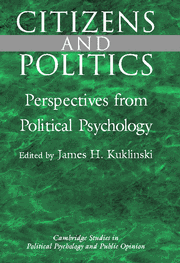Book contents
- Frontmatter
- Contents
- List of Contributors
- Prologue: Political Psychology and the Study of Citizens and Politics
- PART I AFFECT AND EMOTIONS
- Introduction
- 1 The Role of Affect in Symbolic Politics
- 2 Emotions and Politics: The Dynamic Functions of Emotionality
- 3 Cognitive Neuroscience, Emotion, and Leadership
- 4 Emotion as Virtue and Vice
- PART II POLITICAL COGNITION
- PART III POLITICAL ATTITUDES AND PERCEPTIONS
- PART IV POLITICAL VALUES
- Index
- Titles in the series
3 - Cognitive Neuroscience, Emotion, and Leadership
Published online by Cambridge University Press: 07 October 2011
- Frontmatter
- Contents
- List of Contributors
- Prologue: Political Psychology and the Study of Citizens and Politics
- PART I AFFECT AND EMOTIONS
- Introduction
- 1 The Role of Affect in Symbolic Politics
- 2 Emotions and Politics: The Dynamic Functions of Emotionality
- 3 Cognitive Neuroscience, Emotion, and Leadership
- 4 Emotion as Virtue and Vice
- PART II POLITICAL COGNITION
- PART III POLITICAL ATTITUDES AND PERCEPTIONS
- PART IV POLITICAL VALUES
- Index
- Titles in the series
Summary
Over the last decade, as advances in cognitive neuroscience have transformed our understanding of the human brain, it has become evident that emotional responses play a central role in learning and memory. At the same time, experimental studies of the way viewers respond to televised images of leaders have confirmed the central role of emotion as a mediating factor in attitude change. By integrating these two lines of research, I propose a new model of emotion and cognition that helps explain many phenomena in contemporary politics. The resulting psychology of leader–follower relations not only points to serious dangers associated with politics in the television age, but suggests practical reforms in our electoral process.
EXPERIMENTAL STUDIES OF THE EFFECTS OF TELEVISION
It is now generally agreed that television has transformed the political life of industrialized societies because its visual images differ fundamentally from those of print media in their impact. Experimental evidence reveals that seeing a leader on TV elicits emotional responses in viewers (at both a physiological and a conscious level) that can influence attitudes independently of the verbal message. In this process, the leader's facial expressions and nonverbal behavior are often important factors in the viewer's emotional reactions (or “gut reactions”). Thus merely showing the silent images of a leader on television can influence public opinion (for reviews, see Lanzetta et al., 1985; Masters and Sullivan, 1993).
- Type
- Chapter
- Information
- Citizens and PoliticsPerspectives from Political Psychology, pp. 68 - 102Publisher: Cambridge University PressPrint publication year: 2001
- 15
- Cited by

